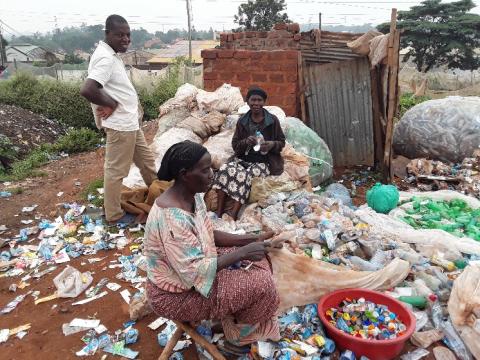Amina shows off her hard fight to save the environment- Marianna Kiwanuka

Sunday is my day off, so, I often chose to walk around and collect my stories from the climate change unsung heroes. Just as I was on my chase to find a hero, I notice an old woman and her grandchildren lost in their work of removing stickers on plastic bottles. Around them are large sacks of bottles, ready to be moved to their next destination. The old woman’s hard work is evident from the way they are lost in what they are doing, I get closer as though to supervise and ask her if she could give me a story on what she is doing, she’s frightened at first. She teases me that her story is for sale. I realised I had not introduced myself to her, which I do. She then accepts to share her story with me. Meet Amina (she only introduced herself as that), who seems to be in her late 60s, a resident of Kinawataka, a Kampala suburb.
Where do you get the bottles from?
I pick these bottles from Kinawataka, Nakawa and in factories, around my area. We try to make sure that no dumped bottle is left on our roads, drainage systems, railway line and on the roadside because if these waste is not well managed, it turns out to be disastrous to the environment. I’m usually called in restaurants to pick the bottles that are dumped there. They see it as a business, but cleanliness creates a good picture at any place of work.
What do you use these bottles for?
After picking these bottles, just like you see them here, together with my grandchildren, we remove the different stickers and pile them together in a net. We then take them to our buyers. Most of the buyers are the factories around us. They recycle these bottles. We put together stickers and dirty bottles that can’t be sold anywhere and set them ablaze. A kilo of these bottles fetches sh400. I use the proceeds to take care of my family. At my age it is very difficult to find a job, so picking bottles is like my golden nugget.
Do you involve any youths in your work?
Yes, one of my grandchildren, a 16-year-old, was reluctant to join, not until he was arrested for committing a crime. When he was released, as a way of reforming, he chose to work with me in collecting bottles. This has kept him busy and it has also kept him away from bad company. My other grandchildren that you found here with me do the work as well and ever since the outbreak of the pandemic, this exercise has kept them busy since schools have been closed for almost a year. Imagine, if this work was not there, they could have been a nuisance to the community by now. It has taught them to be hardworking and also helped them to fall in love with keeping the community clean. As you can see, they do their work with so much zeal, as though it were a competition. Not a day goes by without picking these bottles, it has become our daily routine. Our vision is to have a clean city and community.
What do you think can be done to conserve the environment?
Kampala Capital City Authority should avail us garbage containers, where all our waste can be dumped because, as you can see, despite the fact that we collected these bottles today, the next day, someone will dump waste and the cycle continues. KCCA should pay us for the work we do because we remove waste from the community. Protective equipment like gloves and gumboots should be offered to us. Radio talk shows should be held and factories should allow us pick these bottles from their premises. Most times, we are called thieves or mad people when we try to access factory premises, looking for our jewel. Our customers for these bottles, especially the factory owners, should increase on the amount of money they pay us. For example, a kilo of these bottles fetches sh400 yet it takes me and my grandchildren much time to collect the bottles. We put in a lot of effort, but we are paid little for our services. Our hearts are no longer ignited to save the environment because we are getting little. Day by day, we lose hope. I tried to set up a garden, but I lack seeds and a fence to supplement on my finances.
Marianna Kiwanuka, Kinawattaka
